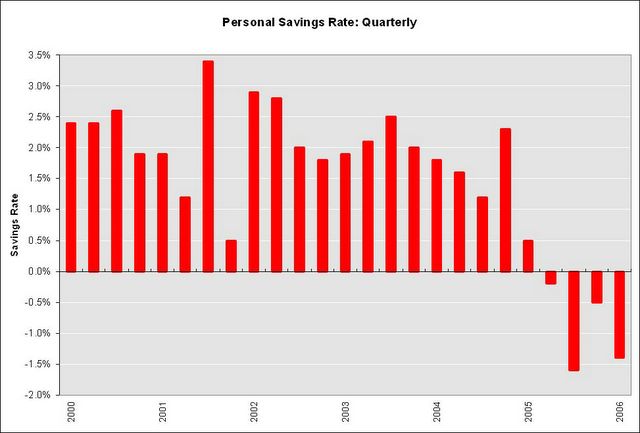US 'could be going bankrupt'
By Edmund Conway, Economics Editor
(Filed: 14/07/2006)
The United States is heading for bankruptcy, according to an extraordinary paper published by one of the key members of the country's central bank.
A ballooning budget deficit and a pensions and welfare timebomb could send the economic superpower into insolvency, according to research by Professor Laurence Kotlikoff for the Federal Reserve Bank of St Louis, a leading constituent of the US Federal Reserve.
Prof Kotlikoff said that, by some measures, the US is already bankrupt. "To paraphrase the Oxford English Dictionary, is the United States at the end of its resources, exhausted, stripped bare, destitute, bereft, wanting in property, or wrecked in consequence of failure to pay its creditors," he asked.
According to his central analysis, "the US government is, indeed, bankrupt, insofar as it will be unable to pay its creditors, who, in this context, are current and future generations to whom it has explicitly or implicitly promised future net payments of various kinds''.
Prof Kotlikoff, who teaches at Boston University, says: "The proper way to consider a country's solvency is to examine the lifetime fiscal burdens facing current and future generations. If these burdens exceed the resources of those generations, get close to doing so, or simply get so high as to preclude their full collection, the country's policy will be unsustainable and can constitute or lead to national bankruptcy.
"Does the United States fit this bill? No one knows for sure, but there are strong reasons to believe the United States may be going broke."
Experts have calculated that the country's long-term "fiscal gap" between all future government spending and all future receipts will widen immensely as the Baby Boomer generation retires, and as the amount the state will have to spend on healthcare and pensions soars. The total fiscal gap could be an almost incomprehensible $65.9 trillion, according to a study by Professors Gokhale and Smetters.
The figure is massive because President George W Bush has made major tax cuts in recent years, and because the bill for Medicare, which provides health insurance for the elderly, and Medicaid, which does likewise for the poor, will increase greatly due to demographics.
Prof Kotlikoff said: "This figure is more than five times US GDP and almost twice the size of national wealth. One way to wrap one's head around $65.9trillion is to ask what fiscal adjustments are needed to eliminate this red hole. The answers are terrifying. One solution is an immediate and permanent doubling of personal and corporate income taxes. Another is an immediate and permanent two-thirds cut in Social Security and Medicare benefits. A third alternative, were it feasible, would be to immediately and permanently cut all federal discretionary spending by 143pc."
The scenario has serious implications for the dollar. If investors lose confidence in the US's future, and suspect the country may at some point allow inflation to erode away its debts, they may reduce their holdings of US Treasury bonds.
Prof Kotlikoff said: "The United States has experienced high rates of inflation in the past and appears to be running the same type of fiscal policies that engendered hyperinflations in 20 countries over the past century."
Paul Ashworth, of Capital Economics, was more sanguine about the coming retirement of the Baby Boomer generation. "For a start, the expected deterioration in the Federal budget owes more to rising per capita spending on health care than to changing demographics," he said.
"This can be contained if the political will is there. Similarly, the expected increase in social security spending can be controlled by reducing the growth rate of benefits. Expecting a fix now is probably asking too much of short-sighted politicians who have no incentives to do so. But a fix, or at least a succession of patches, will come when the problem becomes more pressing."
pyright


